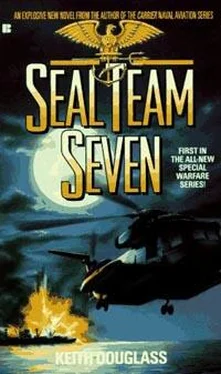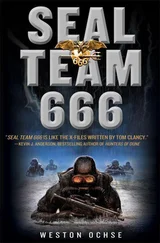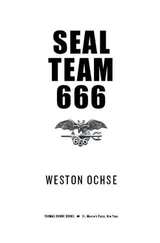Keith Douglass - Seal Team Seven
Здесь есть возможность читать онлайн «Keith Douglass - Seal Team Seven» весь текст электронной книги совершенно бесплатно (целиком полную версию без сокращений). В некоторых случаях можно слушать аудио, скачать через торрент в формате fb2 и присутствует краткое содержание. Жанр: Боевик, на английском языке. Описание произведения, (предисловие) а так же отзывы посетителей доступны на портале библиотеки ЛибКат.
- Название:Seal Team Seven
- Автор:
- Жанр:
- Год:неизвестен
- ISBN:нет данных
- Рейтинг книги:3 / 5. Голосов: 1
-
Избранное:Добавить в избранное
- Отзывы:
-
Ваша оценка:
- 60
- 1
- 2
- 3
- 4
- 5
Seal Team Seven: краткое содержание, описание и аннотация
Предлагаем к чтению аннотацию, описание, краткое содержание или предисловие (зависит от того, что написал сам автор книги «Seal Team Seven»). Если вы не нашли необходимую информацию о книге — напишите в комментариях, мы постараемся отыскать её.
Their cargo includes two tons of weapons-grade plutonium. And now, with enough nuke fuel to arm a superpower, an alliance of fanatics threatens to poison a continent.
In a daring mission of high-seas heroism, Lt. Blake Murdock leads his seven-man unit from Team Seven's Red Squad into bulkhead-to-bulkhead battle — with high-tech
buccaneers who've got nothing left to lose...
Seal Team Seven — читать онлайн бесплатно полную книгу (весь текст) целиком
Ниже представлен текст книги, разбитый по страницам. Система сохранения места последней прочитанной страницы, позволяет с удобством читать онлайн бесплатно книгу «Seal Team Seven», без необходимости каждый раз заново искать на чём Вы остановились. Поставьте закладку, и сможете в любой момент перейти на страницу, на которой закончили чтение.
Интервал:
Закладка:
The Blue Squad rafts traveled side by side at twelve knots, meeting and breasting each swell. Murdock cradled a hand-held radar unit, intermittently sending out a pulse to check on the Yuduki Maru's position. The signal, deliberately tailored to mimic that put out by aircraft search radars, would probably not be picked up at all by the freighter; if it was, it would be dismissed as another of the aircraft that had been prowling the skies around the hijacked plutonium ship for the past several days.
For the next fifteen minutes, Yuduki Maru remained steadily on course. Soon, the SEALs could actually see her, bow-on, her bridge brilliantly illuminated and with running lights to port and starboard, at her prow and at her masthead. Evidently, the hijackers were doing nothing to hide her presence. It was almost as though they were daring the SEALs to attack.
The lights provided the SEALs with one tremendous advantage, however. Guards on her deck would ruin their night vision every time they looked inboard; the SEALS, black-faced, in black garb, aboard black CRRCs, were all but invisible on the black water. The chances that shipboard guards would notice the approach of the SEAL boats were sharply reduced.
Three hundred yards from the Yuduki Maru's bow, the two CRRCs began to separate. MacKenzie, Garcia, and Higgins in one boat steered for the freighter's starboard side. Murdock, Roselli, Brown, and Ellsworth made for the port. Stretched between the two rafts was a two-football-field length of light-weight, slender, but very strong wire rope; the CRRCs drew apart until they were two hundred yards apart and the cable was stretched taut between them. The range to the plutonium ship closed, more gradually now as the cable's drag slowed the CRRCs. The swell was growing worse, sending the rubber boats up each gentle but irresistibly passing mound of water, then sending them sliding man-deep into the trough that followed.
The Yuduki Maru loomed out of the night, her bow wake a ghostly white mustache shining in the darkness, her hull a black cliff towering over the rafts, her superstructure a bulky white castle riding the sky above the aft third of the ship. The freighter passed squarely between the two CRRCs, the throb of its engines booming out of the silence of the night.
Murdock killed the CRRC's engine as the wire rope snagged against the huge ship's bow. With a jerk, the rubber boat's course was reversed; the SEALs clung to handholds set into the gunwales as the Yuduki Maru began dragging them relentlessly forward at eighteen knots, a sleigh ride that carried them up and down the ocean swell with enough velocity to send a cascade of spray over the CRRC's bow. Inexorably, the raft was swung toward the freighter's side. The SEALs were ready as the rubber side thumped heavily against the ship's massive steel cliff, fending off the big ship with gloved hands. Brown secured the raft in place with a limpet magnet and a length of strong line. Wake and ocean swell combined to send the CRRC bobbing up and down at the Yuduki Maru's side. Swiftly, Ellsworth dropped a hydrophone cable over the side; Roselli was already extending a long, telescoping aluminum pole with a hook on the end.
Fully extended, the climbing pole reached thirty feet, high enough that Roselli, supported upright by the others in the boat, was able to snag a deck stanchion with the rubberized tip.
"Solid," Roselli said, giving the pole a hard, downward tug. The rise and fall of the raft at the ship's side threatened to knock both SEAL and extension pole into the sea, but he hung on, riding the motion with practiced skill. The Yuduki Maru's stern was only twenty yards astern, and the turning of her twin screws filled the air with a deep-throated throbbing.
Murdock nodded, then reached for the trigger for the hydrophone. This was a compact, battery-powered device designed to transmit data via a burst of high-frequency sound. Swiftly, he punched in a code group, three numbers that, transmitted through the water to the submerged Santa Fe, indicated that the SEALs had made contact with the Yuduki Maru and were going aboard.
On the other side of the freighter, MacKenzie and his people ought to be going through the same motions, but Murdock and the SEALs in his CRRC would operate as though they were alone. With the message transmitted and their gear ready, Murdock slapped Roselli twice on the shoulder and jabbed his thumb skyward. The chief nodded, then set one rubber-cleated sole against the Yuduki Maru's hull, took a boost as the CRRC rose sharply beneath him with the next wave, and started walking up the ship's side, pulling his way along the climbing pole as though it were a rope and the sheer, steel-plated side of the freighter were simply a glossy black wall of rock.
As Murdock watched Roselli climb, he unslung his H&K subgun, then strapped it into position on the front of his combat web gear. He pulled the mud plug from the muzzle and breach, then racked back the charging lever to chamber the first round. One way or another, the issue was about to be settled.
2311 hours (Zulu +3)
Freighter Yuduki Maru
Step by step, Roselli ascended the side of the Yuduki Maru, a human fly walking the sheer black cliff of the Japanese freighter.
His position was precarious, for the freighter's side bulged out over the raft, and as Roselli climbed the rigid extension pole, he was actually slightly head-down for part of the trip. Water slapped and boiled along the ship's side beneath him, and the first few feet were treacherously slick with a layer of slime. Once he was onto the part of the hull high enough above the water to be more or less dry, he still had to watch each step, for the steel plates were studded with rivets and made dizzyingly uncertain by the rise and fall of the vessel itself. Fortunately, the huge ship's motion in the water was far less than that of the raft at its side. Had the sea been much rougher, however, they would have been forced to come in by helicopter, as he had suggested back at Little Creek. An assault from the sea would have been out of the question.
All in all, however, Roselli had made more difficult climbs during training, scrambling hand-over-hand up dangling lines as instructors and other trainees played blasts of water from fire-hoses at him. Reaching the freighter's afterdeck, he paused to snap a hook attached to his web-gear harness to the stanchion rising just above his head. Then, swinging freely at the vessel's scuppers, he was able to use his hands to grab the edge and chin himself up.
As the new lieutenant had feared, there was a guard on the freighter's fantail... no, two guards. They carried AKM assault rifles, and leaning against the superstructure but within easy reach was the long, twin-handled tube of an RPG rocket launcher. There was light enough from the superstructure at their backs to illuminate both men. They were swarthy, one with a bushy, black beard, the other with at least a week's stubble showing on his face. They were wearing uniforms of some sort, nondescript brown or olive-drab clothing that could have belonged to almost any army in the world. One thing was clear. These two were not Japanese, which could only mean they had arrived off the Hormuz.
One, evidently, had just reached the fantail. Unslinging his AKM, he set it against the bench on which the other man was sitting. "Salaam," the first man said. He reached for his left breast pocket. "Segar mayl dareed?"
"Teshakor meekonam," the seated man replied. He accepted a cigarette from the other. "Kebreet dareed?"
"Baleh. Eenjaw."
Roselli felt a small, inner chill. If they'd made their approach by helicopter, the bad guys would have been waiting for them. A single RPG round would have blown a helo right out of the sky as easily, as efficiently, as an American Stinger surface-to-air missile.
Читать дальшеИнтервал:
Закладка:
Похожие книги на «Seal Team Seven»
Представляем Вашему вниманию похожие книги на «Seal Team Seven» списком для выбора. Мы отобрали схожую по названию и смыслу литературу в надежде предоставить читателям больше вариантов отыскать новые, интересные, ещё непрочитанные произведения.
Обсуждение, отзывы о книге «Seal Team Seven» и просто собственные мнения читателей. Оставьте ваши комментарии, напишите, что Вы думаете о произведении, его смысле или главных героях. Укажите что конкретно понравилось, а что нет, и почему Вы так считаете.












